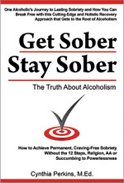Alcoholism Withdrawal
Alcoholism withdrawal may range in severity anywhere from mild discomfort to a severe life-threatening condition. Many alcoholics die from the unexpected severity of symptoms during withdrawal and thus it is my recommendation that anyone who is alcohol dependent should always be supervised by a competent health care provider when confronting recovery. Detox is a serious medical condition and should be treated as such.
The severity of symptoms and length of endurance depends on a number of factors including the level of dependency, how long they've been addicted, the overall health of the individual, the stage of alcoholism the individual is in, how much a person has had to drink and how often they drink. The more alcohol you consume, the more often they consume it and the more severely dependent you are the higher the likelihood you will experience severe alcohol withdrawal.
Alcohol dependence, or any drug dependence for that matter, occurs when repeated use of alcohol or drugs forces the neurons in the brain to adapt to excessive levels of neurotransmitters like dopamine. Over time the neurons can no longer function normally without alcohol or drugs and the brain no longer produces or releases essential neurotransmitters on it's own. When alcohol or the drug of choice is not consumed, then withdrawal symptoms are experienced.
Mild alcoholism withdrawal symptoms usually occur during the first 6-12 hours after the last alcoholic drink and reach there peak within 48 to 72 hours. Although the most dangerous stage of alcohol withdrawal usually passes within 3 to 5 days, some symptoms may linger for weeks or even months when biochemical healing is not addressed and frequently drives the alcoholic to drink again.
A person who has been fighting alcoholism for a decade may likely feel withdrawal symptoms shortly after their last drink whereas someone who is in the early stages of alcoholism may not feel these symptoms for twelve hours or days. Mild symptoms can be extremely uncomfortable however they typically pass within three to five days and are not life threatening.
Mild Alcoholism Withdrawal Symptoms
- Insomnia
- Fatigue
- Depression
- Anxiety
- Jumpiness
- Mood swings
- Irritability
- Cravings to Drink or Drug
Moderate Symptoms of Withdrawal
There is a thin line between mild alcoholism withdrawal symptoms and more moderate symptoms. It typically takes several days for these withdrawal symptoms to pass as well.
- Headaches
- Involuntary eye twitching and movements
- Loss of appetite
- Increased blood pressure
- Sweaty palms
- Hand tremors
- Clammy skin
- Paleness
- Increased heart rate
- Nausea
- Vomiting
Severe Alcoholism Withdrawal Symptoms
Severe withdrawal symptoms can be excruciating and life threatening. In addition to all of the symptoms we've already listed, severe withdrawal symptoms include:
- Visual hallucinations
- Delirium tremens –DTs
- Severe irritability, anxiety, jumpiness
- Black outs
- Muscle tremors
- Fever
- Seizures
- Convulsions
- Death
As mentioned previously, the most severe withdrawal symptom from alcoholism is in fact death –- it can kill you. Your heart rate increases, your muscles spasm including your heart muscle, and your central nervous system can shut down. This is a very critical time in the care of an alcoholic and it must be treated with proper supervision. Repeated bouts of withdrawal can actually lead to brain damage, most often in the hippocampus, a part of the brain that is crucial in regulating emotions and memory.
Traditional treatment centers typically address withdrawal with medication, and this is often necessary for the severely dependent individual to make it through, but then after the danger passes you are left on your own. This is why recovering alcoholics continue to experience high levels of anxiety, depression, fatigue, irritability, mood swings and cravings to drink. The neurons, neurotransmitters and other body systems that were damaged by alcoholism need repaired. If you follow the biochemical approach, it provides the body with essential vitamins, minerals and amino acids that will replenish the neurotransmitters and restore balance, which eliminates cravings and other symptoms like depression, anxiety etc. thus reducing the risk of relapse drastically.
Alcoholism withdrawal is serious business regardless of the level of addiction. Understanding the symptoms and the potential severity of a person’s reaction is essential to successful recovery. Detox in a treatment center that uses biochemical restoration should be your first choice.


